Nigeria drops ball in testing the population for COVID-19
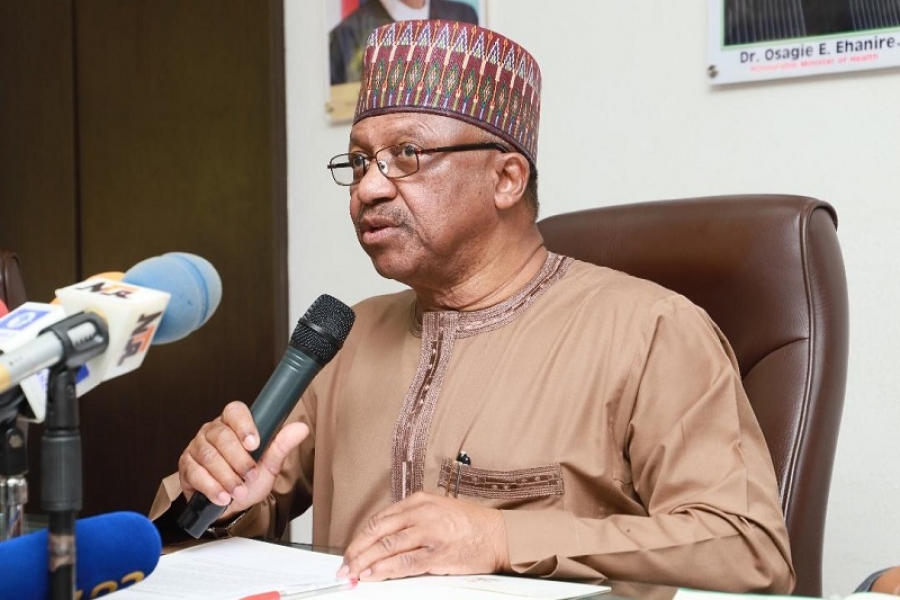
Theophilus Abbah and Daniel Adaji
Testing for COVID-19 has dropped drastically, according to weekly reports by the [i]Nigerian Centre for Disease Control (NCDC) that show continued drops in fewer and fewer records of testing in most of the 36 states and the Federal Capital Territory (FCT). For instance, for the week that ended on April 17, 2022, 18 states recorded single-digit testing for seven days, an indication that many laboratories licensed to test Nigerians for COVID-19 were idle in those states. From March 6 to April 17, 2022, the number of Nigerians tested for the virus across the country dwindled, as shown in the charts below:
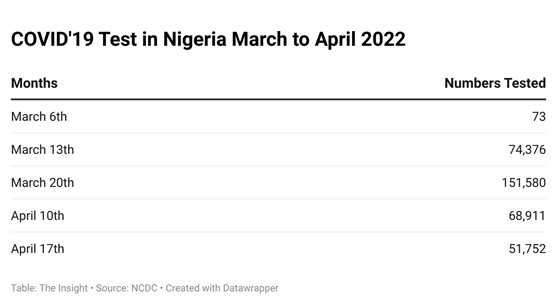
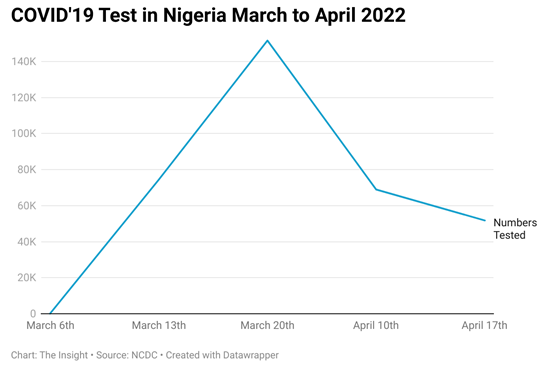
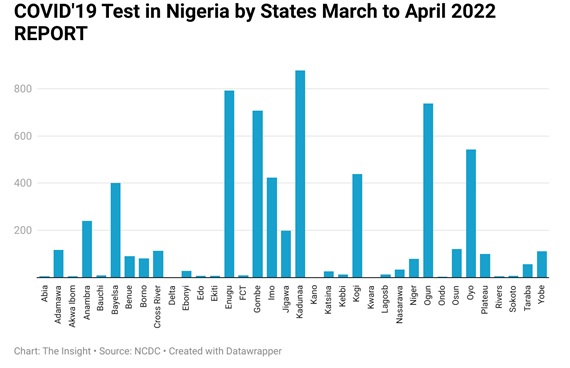
Since February 2020 when COVID-19 broke out in Nigeria, a total of nearly 256,000 cases and 3,143 deaths have been recorded, according to NCDC data. The highest cases of 22,562 and 220 deaths were recorded in Lagos State, followed by 10,291 cases and 202 deaths in neighbouring Oyo State. Other states with high incidences include Edo (7,694 cases and 321 deaths), FCT (6,385 cases and 82 deaths), and Delta (5,369 cases and 111 deaths). However, these figures are believed to be the tip of the iceberg because of the low rate of testing for COVID-19 across the country.
The testing trends have dropped from the height of 1.4 million persons tested in January 2021 to as little as 241,174 in April 2022. The fall in the rate of testing affects the credibility of the number of COVID-19 cases reported in Nigeria. Our World in Data, which produces countries’ 7-day rolling average data on COVID-19, states about Nigeria that “due to limited testing, the number of confirmed cases is lower than the true number of infections.” Its interactive chart on COVID-19 in Nigeria should an inexplicable rise and fall in COVID-19 cases, which may be attributed to haphazard testing for the virus. This downward trend demonstrates the complacency of government and institutions vested with the responsibility of carrying out the tests. With a population of about [ii]211 million, the test rate of 5,152,011 million is barely above two per cent of the people who should be targeted for preventive testing.
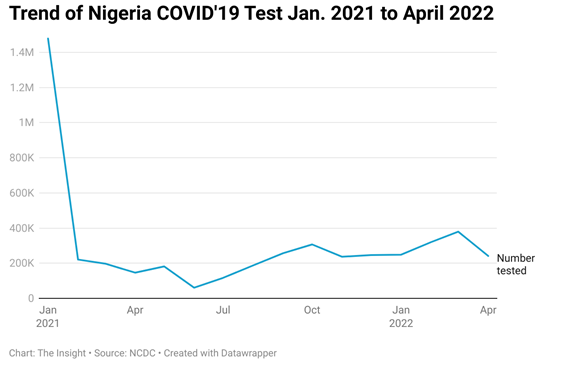
Compared to Nigeria, South Africa has tested as many as 24,885,511, about 40 per cent of its population of 60,756,135. Another African country, Egypt, with a population of 106 million has effectively tested 1,318 per million. Both countries have left Nigeria behind in aggregate testing of citizens for COVID-19.
However, in Nigeria’s strategy document for combating COVID-19, the government identifies testing as an important element, and the NCDC[iii] acknowledges it thus: “Diagnostic testing is an essential response strategy to interrupt the transmission for the COVID-19 pandemic by informing patient management and identifying positive cases, which can then be isolated. The Federal Ministry of Health has prioritised testing as one of the key interventions in the COVID-19 response in Nigeria. To rapidly contain the outbreak, the Government of Nigeria plans to rapidly scale diagnostic testing to cover all 36 States plus the FCT.” The low testing rate belies the content of the government’s strategy document.
The low rate of testing seems to have led to the perception that there is a low risk for COVID-19 in Nigeria.
It has been proven scientifically that testing is critical to contain and mitigate the COVID-19 pandemic, as diagnostic tests help to prevent further person-to-person transmission. With the low rate of testing, the NCDC data on the number of infected Nigerians cannot be reliable, as thousands of persons may be living with COVID-19 but are unaware of it. The World Health Organization estimates that only one in seven COVID-19 infections is being detected in Africa. The number of undetected cases not only increases the risks of infection between individuals but means the virus is likely to be spreading unnoticed and under-reported.
Why Testing is low in Nigeria
Dr Ifeanyi Casmir, a specialist in Laboratory Science, attributes the low rate of testing for COVID-19 in Nigeria to the framework put in place, which prioritizes testing at laboratories owned by the private sector rather than in government-owned laboratories. He argued that owners of laboratories for COVID-19 tests raked in billions of Naira from incoming and outgoing international travellers who are compelled by the Nigerian authorities to present negative test results for the virus.
“We need to adopt rapid testing urgently because we need to know the status of Nigerians at a time several countries are recording cases of new variants of COVID-19″.
He said, “I proposed that COVID-19 testing should be an integral part of our health screening, and should be routine, such that if anyone reported possible cases of cold or malaria in Nigeria, he or she should be tested for COVID-19 for free. The way it is at the moment, testing for the virus is not affordable. It costs between N40,000 and N50,000 to do the molecular testing, which is suspect. To cover more grounds, testing should be free. This is what is done in [iv]Cameroon. The reality is that COVID-19 has come to stay with us, so the test for it should be routine. All this is happening because the Medical Laboratory Science Council of Nigeria is asleep.” The council is vested with the responsibility of assessing and evaluating laboratory testing test centres in Nigeria.
The National Secretary of Society for Scientists in Infectious Diseases in Nigeria, [v]Dr. Solomon Chollom told journalists in March that Nigeria’s testing capacity was compromised by the deployment of low throughput platforms against the use of high throughput ones.
He said, “Other possible reasons are weak surveillance and contact tracing system, lack of motivation of health professionals and the preponderance of negative publicity which characterized every step of the response.”
A Health Economist, Dr Abigail Banji, also argued in March that for Nigeria to continue to combat COVID-19 effectively, all relevant agencies must “Scale-up vaccination, advance COVID-19 rapid antigen self-testing, access to COVID-19 treatment, and promote public health and social measures.”
She warned that though new COVID-19 cases and deaths were on the decline globally, the pandemic was far from being over. “There are still many countries with high rates of hospitalization, deaths, low rates of vaccine coverage and high transmission. Nigeria is included. The threat of a new and more dangerous variant remains very real.”
The low rate of testing seems to have led to the perception that there is a low risk for COVID-19 in Nigeria. This is because those who take ill have no opportunity of being tested for COVID-19 as laboratories are not readily available, or the cost is prohibitive. The main method available is a molecular test which, though produces precise and more reliable results, is expensive, with a relatively long turnaround time of 3-4 days.
‘How to ramp up testing’
To increase testing for COVID-19 in Nigeria, Professor Oyewole Tomori, a virologist, advocated for a shift from PCR to rapid tests, which are cheaper and affordable because, with rapid test instruments, individuals could even test themselves for the virus. “We need to adopt rapid testing urgently because we need to know the status of Nigerians at a time several countries are recording cases of new variants of COVID-19. In southern Africa, for instance, there are about five variants of Omicron already discovered. If Nigerians are not tested, we cannot detect if we have any of those variants here. With the lull in testing, the impression we get is that Nigeria has exited from COVID-19; this is false.”
The majority of those who are eager for vaccination are intending travellers, who are required to present COVID-19 vaccination certificates at ports of exit and entry.
Apart from procuring facilities for rapid tests for COVID-19, Professor Tomori said the National Primary Health Care Development Agency (NPHCDA), responsible for vaccination, must devise strategies to ensure more Nigerians have access to the jab, as quickly as possible. “We’re getting a deluge of vaccines, but Nigerians are not taking them. In the end, many of the vaccines will expire and get wasted. This is a tragedy, as far as I’m concerned.”
Data obtained from ONE.org, a data aggregation outfit about Africa, indicate that as of April 2022, [vi]Nigeria had received 68.1 million doses of COVID-19 vaccines, but only about a half of that quantity, 34 million, has been used. For vaccination, only about 16.5 per cent of the population has been covered, while only about 6.3 per cent of Nigerians has received the two doses of COVID-19 vaccines.
However, the Director-General of PHCDA, Dr Fasail Shuab, says his organization is not giving up on vaccinations. “We are still vaccinating Nigerians. Right now we are at a point where we have exceeded a daily vaccination rate of over 230,000. The last time we had the report, the daily vaccination rate was around 210,000. So more Nigerians are coming out to get vaccinated.” The majority of those who are eager for vaccination are intending travellers, who are required to present COVID-19 vaccination certificates at ports of exit and entry.
Dr Ifedayo Adetifa, the Executive Director of NCDC, did not respond to an enquiry about what his agency is doing to ramp up testing, but his office replied to a WhatsApp message, saying “It has already been established that Nigerians’ perception of the risk of COVID-19 is generally low so, in turn, testing will be low. We have made efforts to ensure states have adequate laboratory supplies and that the use of rapid test kits is scaled up.”
There are about 140 testing centres across Nigeria. However, the [vii]NCDC update for the week that ended on April 17 shows that 60 of them recorded zero tests or unreported results of tests, while many of the testing centres that conducted COVID-19 tests reported between one and two digits of tests for that week.
This piece was produced in partnership with the ONE Campaign, a global campaign and advocacy organization. For more information on the impacts of conflict, climate change, and COVID in Africa, subscribe to ONE’s Aftershocks newsletter or explore the data.
[i] Nigeria Centre for Disease Control (ncdc.gov.ng)
[ii] Nigeria Population Growth Rate 1950-2022 | MacroTrends
[iii] COVID19TestingStrategy_2ZWBQwh.pdf (ncdc.gov.ng)
[iv] N50,400 for COVID-19 test in Nigeria, free in Cameroon — Sport — The Guardian Nigeria News – Nigeria and World News
[v] https://von.gov.ng/2022/03/16/only-2-1-per-cent-of-nigerias-population-tested-for-covid-19-ncdc/

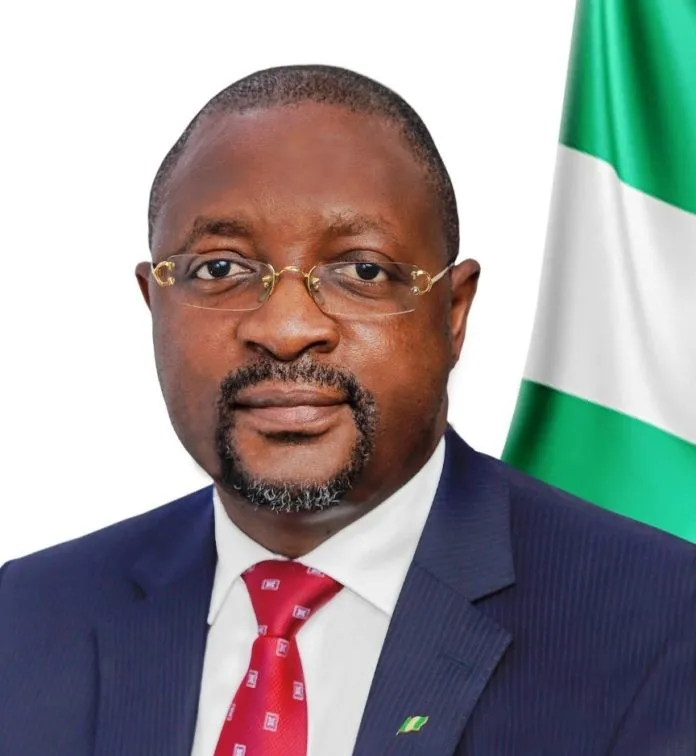
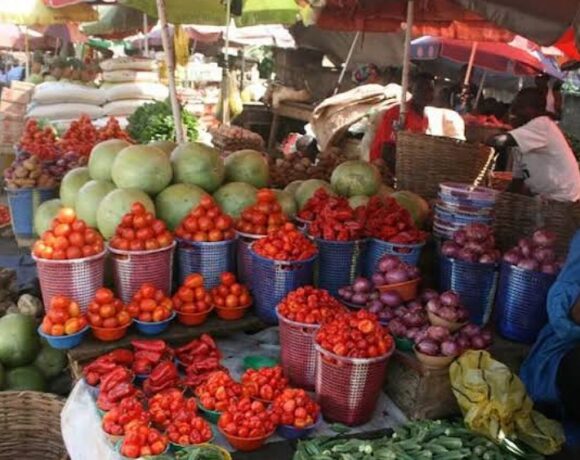

услуги опрессовка системы отопления says:
There is certainly a lot to know about this subject.
I really like all the points you have made.